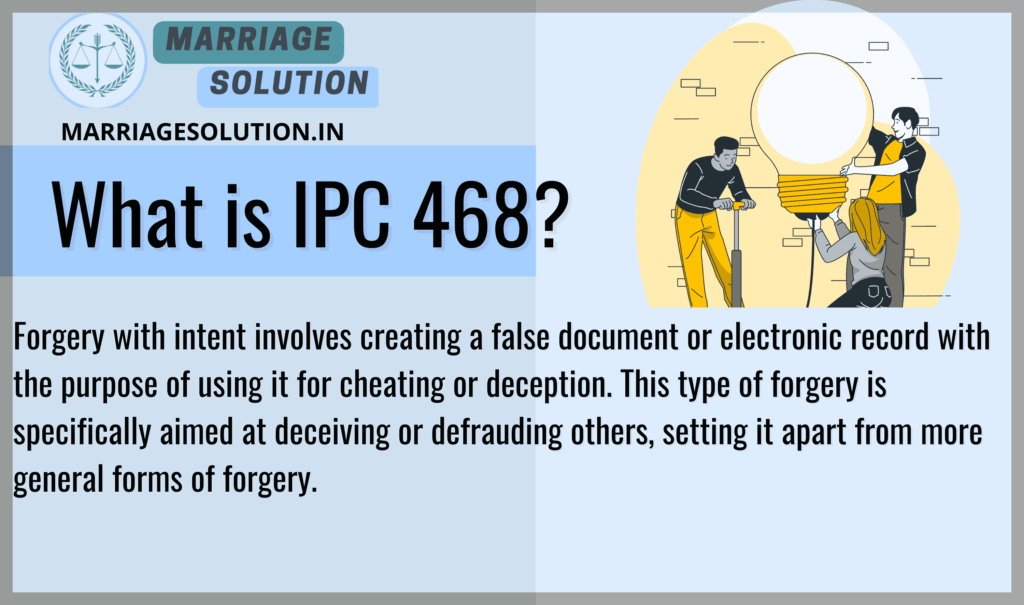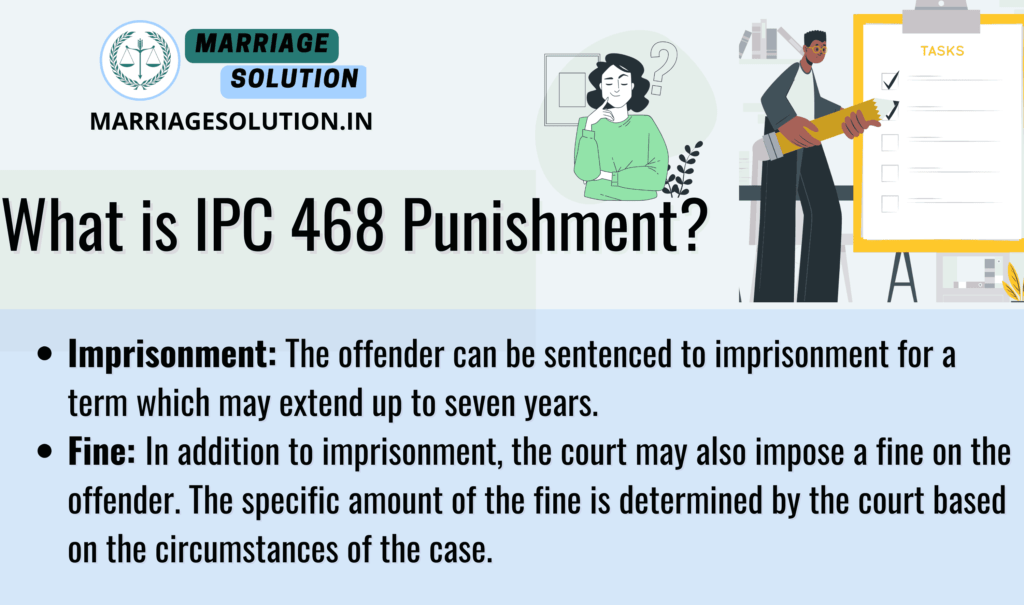Introduction of IPC Section 468
IPC Section 468 deals with making fake documents or electronic records to cheat someone. If someone creates a false document or record to trick or deceive others, they can be punished with up to seven years in prison and a fine. This law aims to stop fraud by imposing strict penalties on those who forge documents for dishonest purposes. It’s a serious rule meant to discourage people from using fake documents to cheat others.

What is IPC Section 468 ?
Forgery with intent involves creating a false document or electronic record with the purpose of using it for cheating or deception. This type of forgery is specifically aimed at deceiving or defrauding others, setting it apart from more general forms of forgery.
IPC Section 468 Overview
- Forgery with Intent: This involves creating a false document or electronic record with the intention to use it for cheating or deceptive purposes.
- Cheating Purpose: The forged document or record is specifically intended to deceive or defraud others, distinguishing it from general forgery crimes.
- Punishment Severity: The punishment for IPC 468 is severe, with imprisonment for up to seven years, highlighting the seriousness of forging documents with fraudulent intent.
- Additional Fine: In addition to imprisonment, the offender may also face a fine, the amount of which is decided by the court.
- Non-Bailable Offense: IPC 468 is categorized as a non-bailable offense, emphasizing the gravity of the crime and the need for stringent legal measures.
- Specific Provision: This section of the IPC is specifically designed to address forgery committed with the purpose of cheating, setting it apart from broader forgery laws such as IPC 465.
IPC 468 Punishment
- Imprisonment: The offender can be sentenced to imprisonment for a term which may extend up to seven years.
- Fine: In addition to imprisonment, the court may also impose a fine on the offender. The specific amount of the fine is determined by the court based on the circumstances of the case.

468 IPC bailable or non bailable ?
IPC Section 468 is a non-bailable offense. This means that if a person is accused of committing an offense under IPC 468 (forgery for the purpose of cheating), they cannot be granted bail as a matter of right. Bail may be granted at the discretion of the court based on various factors such as the seriousness of the offense, evidence against the accused, and other relevant circumstances. However, generally speaking, offenses classified as non-bailable indicate a higher severity level and stricter legal consequences.
Section 468 IPC in short information
| Aspect | IPC 468 |
|---|---|
| Offense | Forgery for Purpose of Cheating (Falsification) |
| Definition | Creating or altering documents or electronic records with the intention to cheat someone. This includes making fake documents, changing real ones, or tampering with records to deceive others for personal gain. |
| Punishment | Imprisonment for a term extending up to seven years and/or a fine. |
| Bailable | The offense is considered non-bailable, meaning accused individuals may not be granted bail before their trial. |
468 IPC FAQS
What is IPC 468?
IPC 468 states that whoever commits forgery, intending that the forged document or electronic record shall be used for the purpose of cheating, shall be punished with imprisonment of either description for a term which may extend to seven years, and shall also be liable to fine.
Is IPC 468 Bailable?
The offense under IPC 468 is a non-bailable offense.
What is the essence of the offense under IPC 468?
The essence of the offense under IPC 468 is committing forgery with the intention that the forged document or electronic record shall be used for the purpose of cheating or defrauding others.
Is forgery alone sufficient for an offense under IPC 468?
No, forgery alone is not sufficient for an offense under IPC 468. The forgery must be committed with the specific intent to use the forged document or electronic record for cheating or defrauding others.
What is the maximum punishment for an offense under IPC 468?
The maximum punishment for an offense under IPC 468 is imprisonment of either description (simple or rigorous) for a term which may extend to seven years, and the offender shall also be liable to pay a fine.
If you need support with court proceedings or any other legal matters, don’t hesitate to reach out for assistance.
Court or any other marriage-related issues, our https://marriagesolution.in/lawyer-help-1/ website may prove helpful. By completing our enquiry form and submitting it online, we can provide customized guidance to navigate through the process effectively. Don’t hesitate to contact us for personalized solutions; we are here to assist you whenever necessary!
